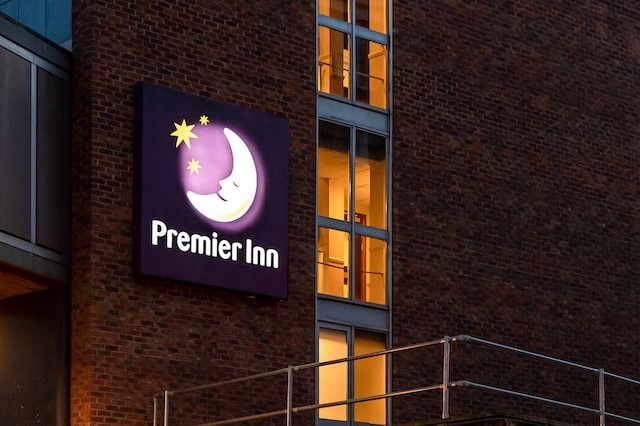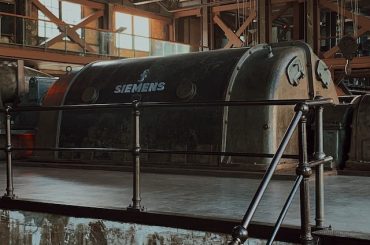Before we dive deep into the PESTEL analysis, let’s get the business overview of Premier Inn Hotel. Premier Inn is a leading hotel brand in the UK, offering comfortable and affordable accommodations mainly targeted at business travelers, families, and tourists. It is owned by Whitbread, the UK’s largest hospitality company. Here’s a concise overview of the business:
- Origins: Premier Inn started its journey in 1987 under the name “Travel Inn.” The brand was created to compete with the Travelodge brand in the UK.
- Growth & Presence: Premier Inn Hotel has over 800 hotels with more than 77,000 rooms across the UK. The brand has expanded internationally, with hotels in Germany, the Middle East, and Asia.
- Value Proposition: Premier Inn is known for providing good quality rooms at mid-range prices. They often promote their “Good Night Guarantee,” emphasizing the comfort of their beds and the quality of sleep guests will receive.
- Expansion: Premier Inn has been steadily growing not only in the UK but also in international markets. For instance, it has shown particular interest in the German market, aiming to become one of the country’s leading budget hotel operators.
- Financial Performance 2022: Premier Inn owner Whitbread has reported statutory revenue of £2.6b in its latest financial results, 27% ahead of pre-pandemic levels. Total UK accommodation sales were 37% ahead of pre-pandemic levels, and, as a result, the group saw statutory profit before tax of £375m, 34% ahead of Whitbread’s 2020 financial year.
Here is the PESTEL analysis of Premier Inn Hotel
A PESTEL analysis is a strategic management framework used to examine the external macro-environmental factors that can impact an organization or industry. The acronym PESTEL stands for:
- Political factors: Relate to government policies, regulations, political stability, and other political forces that may impact the business environment.
- Economic factors: Deal with economic conditions and trends affecting an organization’s operations, profitability, and growth.
- Sociocultural factors: Relate to social and cultural aspects that may influence consumer preferences, lifestyles, demographics, and market trends.
- Technological factors: Deal with developing and applying new technologies, innovations, and trends that can impact an industry or organization.
- Environmental factors: Relate to ecological and environmental concerns that may affect an organization’s operations and decision-making.
- Legal factors: Refer to the laws and regulations that govern businesses and industries.
In this article, we will do a PESTEL Analysis of Premier Inn Hotel.
PESTEL Analysis Framework: Explained with Examples
Political
- Regulations and Compliance: The hospitality industry, including hotels like Premier Inn, is subject to a wide range of local, national, and international regulations. This includes health and safety standards, employment laws, and licensing requirements. Changes in these regulations can impact how Premier Inn operates.
- Tourism Policies: The UK government’s policies on tourism, including promotions, subsidies, and visa regulations, can directly affect the inflow of tourists and, consequently, Premier Inn’s occupancy rates.
- Taxation Policies: Changes in taxation, especially those related to the tourism and hospitality sectors, can impact Premier Inn’s profitability. For instance, fluctuations in the rate of Value Added Tax (VAT) on hotel accommodations can directly affect room pricing strategies.
- Local Council Decisions: Local council decisions related to zoning, land use, and urban development can impact where and how Premier Inn can expand or renovate its existing properties.
- Government Initiatives: Government campaigns promoting local tourism, staycations, or specific regions can benefit hotels like Premier Inn if they align with these initiatives.
Economic
- Economic Cycles: The general state of the economy can significantly impact the hospitality industry. In boom periods, more people travel for business and leisure, increasing occupancy rates. During recessions, people might cut back on discretionary spending, including travel, which could reduce demand for hotel rooms.
- Exchange Rates: As a UK-based company, Premier Inn could be affected by GBP fluctuations. A weaker GBP might boost inbound tourism as the UK becomes a more affordable destination, potentially benefitting Premier Inn. On the other hand, if Premier Inn sources products or services from abroad, a weak pound could increase costs.
- Inflation Rates: Rising inflation can increase operational costs for Premier Inn, from wages to supply costs. The hotel chain might need to adjust its pricing strategy to maintain profit margins in inflationary environments.
- Employment Levels: High employment levels usually translate to more business travel, as companies are more willing to send employees for training, conferences, and meetings. Furthermore, employed individuals have higher disposable incomes and are more likely to travel for leisure.
- Competitive Pricing: The hotel industry is competitive, and Premier Inn must constantly assess its pricing strategy in relation to competitors. Economic factors play a crucial role in determining room rates and promotional offers.
- Real Estate Market Dynamics: For expansion, Premier Inn requires property. The economic dynamics of the real estate market, including property prices and rental rates, can influence Premier Inn’s expansion strategy and costs.
Sociocultural
- Travel Culture: The trend of frequent weekend getaways and short breaks has gained popularity over the years. If more people are inclined to travel domestically, this can boost the demand for Premier Inn rooms.
- Health and Safety Concerns: The expectation of hotel cleanliness and safety has become paramount, especially during health crises like the COVID-19 pandemic. Travelers prioritize hotels that guarantee safety and hygiene standards.
- Consumer Preferences: Many consumers prefer experiential stays over traditional ones. The hotel’s ability to offer unique experiences or package deals can influence bookings.
- Work Culture: The rise of remote work and the “workcation” trend, where people combine work and vacation, means hotels like Premier Inn can cater to these guests by offering amenities suited to working, such as high-speed Wi-Fi, workspaces, etc.
- Dietary and Lifestyle Preferences: As health and well-being awareness grows, there’s an increasing demand for specialized services, such as vegan or gluten-free food options, gyms, and wellness centers.
- Cultural Events and Festivals: Local cultural events, festivals, or significant events can lead to a surge in bookings. Premier Inn can tap into these opportunities with special packages or promotional offers.
- Family Dynamics: The increasing number of single-parent families, extended families traveling together, or couples without children all have distinct needs. Tailoring room options and amenities to these varying family structures can be beneficial.
- Local Integration: Travelers increasingly seek local experiences. Integrating local culture, cuisine, and experiences into the hotel’s offerings can give Premier Inn an edge over competitors.
Technological
- Booking Systems: The rise of online booking platforms like Booking.com, Expedia, and others means Premier Inn needs a robust, user-friendly online booking system. Ensuring compatibility with these platforms and offering direct booking incentives on their website can increase reservations.
- Smart Room Technology: Implementing IoT (Internet of Things) in rooms can allow guests to control lighting, temperature, TV, and other amenities via their smartphones or voice commands.
- High-speed Wi-Fi: A consistent and high-speed internet connection has become a basic expectation for most travelers, whether for leisure or business.
- Data Analytics: Using data analytics to understand guest preferences can lead to personalized marketing and enhanced guest experiences. It can provide insights into peak booking times, popular amenities, and guest demographics.
- Virtual Reality (VR) and Augmented Reality (AR): These can be used for virtual hotel tours, enabling potential guests to experience the hotel before booking. AR can also be used in rooms to provide information or entertainment.
- Artificial Intelligence: Chatbots and AI-driven customer service can provide guests with 24/7 inquiry resolution. AI can also assist in personalizing the guest experience based on their preferences and past behavior.
- Security Systems: Advanced security systems, including digital room keys, CCTV monitoring, and other security tech, can ensure guest safety and protect against breaches.
- Payment Technologies: With the growth of digital payments, offering various payment methods, including mobile wallets, online transfers, and contactless payments, is essential.
- Integration with Smart Devices: Allowing guests to connect their devices to hotel systems, like streaming their content on the room’s TV, can enhance their stay.
Environmental
- Sustainability Initiatives: As awareness about environmental issues grows, many guests actively choose hotels prioritizing sustainability. Premier Inn can capitalize on this by adopting eco-friendly initiatives, such as using renewable energy, implementing water-saving measures, and reducing waste.
- Waste Management: Hotels generate significant waste, from food to disposable amenities. Implementing comprehensive waste management and recycling systems is environmentally responsible and can also be a selling point for eco-conscious guests.
- Supply Chain: Sourcing locally-produced goods, whether food for the restaurant or room materials, can reduce transportation emissions and promote local economies. An eco-friendly supply chain is becoming a significant consideration for many businesses.
- Biodiversity: If Premier Inn hotels are located in areas rich in biodiversity, it’s essential to ensure that the hotel operations do not disrupt local ecosystems. This includes considering construction impacts and daily operations.
- Building Design and Materials: Using sustainable building materials and designs that reduce energy consumption (like green roofs or passive solar design) can have a long-term impact on the hotel’s energy use and overall environmental footprint.
- Green Certifications: Achieving certifications from recognized environmental bodies can give Premier Inn a competitive edge, as these certifications can mark the hotel’s commitment to environmental sustainability.
Legal
- Licensing and Regulations: Hotels must adhere to various licensing requirements, including everything from alcohol sales to entertainment licenses. Premier Inn would need to ensure that each of its locations meets the specific licensing requirements of its locality.
- Health and Safety: The hospitality industry is bound by stringent health and safety regulations. This covers areas such as food safety in their restaurants, the safety of the hotel facilities, fire regulations, and more. Non-compliance can result in hefty fines and damage to reputation.
- Employment Laws: Premier Inn must abide by employment regulations in every region. This includes laws related to minimum wage, working hours, discrimination, and rights to unionize.
- Data Protection and Privacy: With hotels collecting vast amounts of personal data from guests, regulations such as the GDPR in Europe have implications for how this data is stored, processed, and shared.
- Consumer Protection Laws: These laws ensure that guests get the services they pay for and can address grievances. Premier Inn must ensure that advertising and marketing are transparent and not misleading.
- Real Estate and Zoning Laws: When expanding or building new hotels, Premier Inn needs to be aware of local zoning laws, which dictate what can be built where and any related environmental assessments.
- Taxation Laws: Different regions have different taxation structures, including tourism taxes or city-specific levies. Premier Inn needs to be compliant to avoid legal complications.
- Contract Laws: Premier Inn will enter into various contracts, whether with suppliers, customers, or partners. Ensuring these contracts are legally sound and protect the interests of the hotel is vital.











